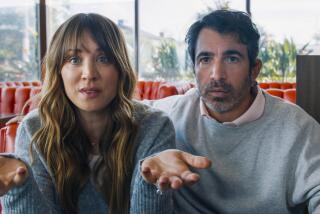TV Reviews : Bonnie and Clyde, the ‘True’ Story
Writer-director Gary Hoffman’s “Bonnie and Clyde: The True Story” (at 8 tonight on KTTV-TV Channel 11 and XETV-TV Channel 6) is a well-cast and largely entertaining account of the brief lives of the legendary outlaws that nevertheless is an opportunity missed.
Since the 1967 classic “Bonnie and Clyde” dealt with gangster mythology and what it revealed about the Depression in particular and the American propensity for violence in general, it left lots of room for a more factual, biographical version. The trouble is that Hoffman doesn’t tell us enough about what made robbers Bonnie Parker (Tracey Needham) and Clyde Barrow (Dana Ashbrook) leave such a bloody trail of corpses across the Southwest in the depth of the Depression.
We’re surprised to discover that both of these teen-agers come from solidly middle-class homes that are spacious and nicely furnished. Clyde has some trouble reading, but Bonnie has been a good student and writes poetry. Both Bonnie and Clyde have loving, caring mothers (Betty Buckley as the canny Mrs. Parker, Louanne Stephens as the less effectual Mrs. Barrow).
As in the Arthur Penn film, there’s no dealing with Clyde’s reputed sexual ambiguity; here, he’s presented as a sure-fire stud.
Aside from a sense of authentic details, all those “accounts of relatives and others who knew them,” as the press handout reads, that formed the basis for the script apparently didn’t provide Hoffman much hard news or many insights into Bonnie and Clyde.
Consequently, “Bonnie and Clyde: The True Story” proceeds as a conventional mixed-up teen-agers tale that unfolds smoothly against period-perfect East Texas locales. Ashbrook brings a nervy, dangerous and charismatic quality to Clyde, and Needham is adept at revealing a sensuous, tempestuous woman beneath Bonnie’s well-mannered, kindly demeanor.
Hoffman is effective in showing us how rapidly Bonnie and Clyde plunge into deep trouble; indeed, how quickly people can wreck their lives is the film’s real point. He also deserves credit for not glamorizing them or their fates, and he leaves us with the feeling that while Clyde was headed inexorably for a bad end, Bonnie could very easily have continued her ordinary existence had she never met Clyde.
More to Read
The complete guide to home viewing
Get Screen Gab for everything about the TV shows and streaming movies everyone’s talking about.
You may occasionally receive promotional content from the Los Angeles Times.






